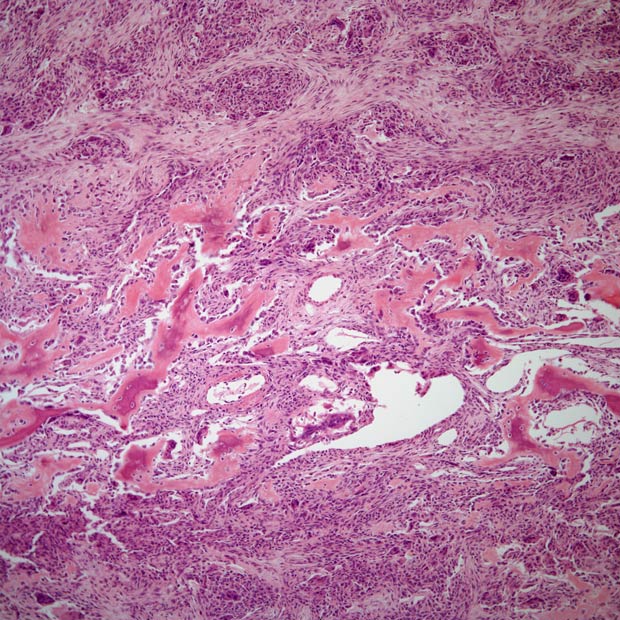Novel Drug Receives FDA Breakthrough Therapy Designation for R/R Osteosarcoma
GSK5764227 yielded promising antitumor efficacy while showing no new safety signals in patients with relapsed/refractory osteosarcoma, the phase 2 ARTEMIS-002 trial found.
GSK5764227 yielded promising antitumor efficacy while showing no new safety signals in patients with relapsed/refractory osteosarcoma, the phase 2 ARTEMIS-002 trial found.

GSK5764227 (GSK’227), a B7-H3-targeted antibody-drug conjugate, has been granted breakthrough therapy designation by the FDA for the treatment of adult patients with relapsed/refractory osteosarcoma who have also progressed on 2 or more prior lines of therapy, according to a press release from the developer, GSK.1
Data from the open-label, randomized phase 2 ARTEMIS-002 trial (NCT05830123) evaluating the efficacy, safety, and pharmacokinetics of GSK’227 as a monotherapy in patients with relapsed or refractory osteosarcoma and other sarcomas was presented at the 2024 American Society of Clinical Oncology Annual Meeting (ASCO) and informed the FDA’s decision.
“This latest regulatory designation for GSK’227 exemplifies the potential of our targeted antibody-drug conjugate in patients with difficult-to-treat cancers.” Hesham Abdullah, senior vice president and global head of oncology, research and development, at GSK, said in the press release.1 “For patients with relapsed/refractory osteosarcoma, there is an urgent unmet medical need with no approved treatment options once the cancer returns a second time, and chemotherapy provides limited benefit in this setting.”
In patients with osteosarcoma, the overall response rate (ORR) for those given 8.0 mg/kg of GSK’227 (n = 15) was 0% (95% CI, 0.0%-21.8%) and 17.4% (95% CI, 5.0%-38.8%) at 12.0 mg/kg (n = 23). The median follow-up for each respective arm was 8.2 months and 2.8 months.2 The disease control rate (DCR) was 66.7% (95% CI, 38.4%-88.2%) at 8.0 mg/kg and 87.0% (95% CI, 66.4%-97.2%) at 12.0 mg/kg. Median duration of response (DOR) was not available for both dosages.
At the data cutoff date of March 20, 2024, 52.6% of patients were still receiving treatment. The median progression-free survival (PFS) was 4.0 months at 8.0 mg/kg and the median PFS data were not mature at 12.0 mg/kg.
The most common treatment-emergent adverse events (TEAEs) of any grade at 8.0 mg/kg were decreased white blood cell count, decreased neutrophil count, fever, anemia, decreased platelet count, and decreased lymphocyte count; of grade 3 or higher, the most common TEAEs were decreased lymphocyte count, decreased white blood cell count, decreased neutrophil count, and anemia.
At 12.0 mg/kg, the most common TEAEs of any grade decreased white blood cell count, decreased neutrophil count, anemia, decreased platelet count, and decreased lymphocyte count; of grade 3 or higher, the most common TEAEs were decreased white blood cell count, decreased neutrophil count, decreased lymphocyte count, decreased platelet count, and anemia.
Patients in the osteosarcoma cohort of the trial (n = 42) were randomly assigned, in a 1:1 ratio, to receive either 8.0 mg/kg (n = 16) of GSK’227 or 12.0 mg/kg (n = 26), with both treatments given every 3 weeks.
Eligible patients were 18 years or older with histologically confirmed osteosarcoma or other sarcomas who had progressed on 1 or more lines of prior systemic treatment, had at least one measurable lesion per RECIST 1.1 and an ECOG performance status of 0 or 1, and agreed to provide fresh or archival tumor tissue and peripheral blood samples.
The trial’s primary end point was ORR per investigator. Secondary end points were ORR per independent review committee, DCR, DOR, and PFS per investigator, overall survival, and safety.
The ARTEMIS-002 trial is part of a development plan to aid a registrational pathway for GSK’227; a recent, global phase 1 trial (NCT06551142) evaluating GSK’227 in patients with advanced solid tumors is also underway.
In August 2024, GSK’227 received the breakthrough designation for the treatment of extensive-stage small-cell lung cancer (ES-SCLC).3 In December 2024, the European Medicines Agency granted the priority medicines designation to the agent for the treatment of ES-SCLC.4
References
- GSK’s B7-H3-targeted antibody-drug conjugate, GSK’227, receives US FDA breakthrough therapy designation in late-line relapsed or refractory osteosarcoma. News release. GSK. January 7, 2025. Accessed January 8, 2025. https://tinyurl.com/5n6zx9vb
- Xie L, Xu J, Sun X, et al., ARTEMIS-002: phase 2 study of HS-20093 in patients with relapsed or refractory osteosarcoma and other sarcomas. J Clin Oncol. 2024;42(suppl 16):abstr 11507. doi:10.1200/JCO.2024.42.16_suppl.11507
- GSK receives US FDA breakthrough therapy designation for its B7-H3-targeted antibody-drug conjugate in relapsed or refractory extensive-stage small-cell lung cancer. News release. GSK. August 20, 2024. Accessed January 8, 2025. https://tinyurl.com/4e2yecs7
- GSK’s B7-H3-targeted antibody-drug conjugate, GSK’227, receives EMA priority medicines (PRIME) designation in relapsed extensive-stage small-cell lung cancer. News release. GSK. December 16, 2024. Accessed January 8, 2025. https://tinyurl.com/2a76mt8t
Sarcoma Awareness Month 2023 with Brian Van Tine, MD, PhD
August 1st 2023Brian Van Tine, MD, PhD, speaks about several agents and combination regimens that are currently under investigation in the sarcoma space, and potential next steps in research including immunotherapies and vaccine-based treatments.